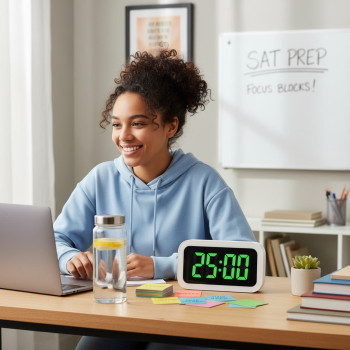Why Staying Healthy Matters in the Final Week
You’ve practiced, taken practice tests, and polished your timing in Bluebook. Now the calendar squares get smaller and the pressure feels louder. The last thing you want is sniffles, fever, or a panic-worthy trip to the nurse the morning of the Digital SAT. Illness can blunt focus, drain energy, and cost you precious performance — but the good news is, many of the things that protect your health in everyday life are exactly the things that protect your test score.
This guide walks you through realistic, evidence-based steps to reduce your chances of getting sick in the crucial days before the exam. Think of this as your final-week game plan: practical, human, and doable — no miracle cures, just smart habits that add up. Wherever it fits naturally, you’ll see how targeted support like Sparkl’s personalized tutoring (1-on-1 guidance, tailored study plans, expert tutors, and AI-driven insights) can reduce stress and help you preserve the energy you need to perform at your best.
A quick mindset shift
Instead of frantically cramming and ignoring your body, choose a protective strategy: treat the week before the test more like a recovery period than a sprint. Small adjustments now protect the work you’ve already put in.
Seven Practical Steps to Reduce Your Risk of Illness
1. Prioritize sleep — seriously
When you sleep, your immune system does some of its best work. In the final week, aim for consistent bedtimes and wake times to stabilize your body clock. Deep, restorative sleep helps memory consolidation — the process that moves facts and problem-solving strategies into longer-term recall.
- Target 8–9 hours per night when possible; if that’s unrealistic, aim for at least 7.
- Keep screens out of bed and dim lights an hour before sleep to help melatonin production.
- If nerves keep you up, try a short bedtime routine: warm shower, light stretch, 5–10 minutes of journaling to offload anxious thoughts.
2. Make food your ally
What you eat fuels attention and immune defense. In the days before the exam, emphasize balanced meals that provide steady energy and important micronutrients.
- Choose complex carbs (oatmeal, whole-grain toast, brown rice) plus protein to stabilize blood sugar.
- Include fruits and vegetables for vitamin C, zinc, and antioxidants — think berries, oranges, bell peppers, and dark leafy greens.
- Stay hydrated. Dehydration can mimic fogginess; drink water consistently rather than chugging on the morning of the test.
- Avoid heavy, greasy, or unfamiliar foods in the 48 hours before the test to prevent stomach upset.
3. Hygiene tactics that actually help
Germs spread through contact and respiratory droplets. A few practical hygiene habits drastically reduce exposure without turning you into a hermit.
- Wash your hands often, especially after transit, using public devices, or before eating. When soap isn’t available, use hand sanitizer with at least 60% alcohol.
- Avoid touching your face with unwashed hands.
- Consider a lightweight, breathable mask for crowded indoor spaces in the two days before the exam if you or your household are experiencing respiratory illnesses in your area.
- When someone at home is sick, try to minimize close contact and avoid sharing utensils or towels.
4. Manage stress — lower stress, lower sickness risk
Stress affects immune function and attention. The last week is often more about staying calm than learning new content.
- Break study time into short, focused blocks (50 minutes work, 10–15 minutes break). Use breaks for light movement or breathing exercises.
- Practice a simple 5-minute breathing routine each evening: inhale 4 seconds, hold 4, exhale 6. It lowers heart rate and calms the mind.
- Limit doom-scrolling on test forums the night before — choose one trusted source for any last-minute logistics.
5. Smart study scheduling: taper, don’t sprint
Cramming in the final days creates fatigue and reduces your body’s resilience. Instead, taper intensity and keep practice targeted.
- Focus on review rather than new topics: light practice sets, formula checks, and problem review that reinforces strengths.
- Use one polished, timed practice section early in the week to keep timing sharp — no more than one full-length test 3–4 days before the SAT.
- Reserve the 48 hours before the test for light review, checklists, and rest.
6. Keep your environment clean and calming
A tidy, ventilated space is more than aesthetic — it reduces exposure to lingering pathogens and supports good sleep.
- Open windows for short periods to air out the room whenever possible.
- Wipe down high-touch surfaces like keyboards, phone screens, and study tables if someone has been ill recently.
- Create a “calm corner” for breaks: a comfortable chair, soft lighting, and a small timer for mindful pauses.
7. Plan for contingencies: know your options if you do get sick
Even with the best precautions, people get sick. Having a plan reduces stress and ensures you take the right steps if symptoms appear.
- Know test-day policies: if you’re seriously ill, learn how to request a makeup or contact College Board’s test-day support. Keep your College Board account and test admission ticket details handy.
- If you feel mildly unwell, check symptoms and consult a family physician or school nurse to determine whether testing or staying home is necessary.
- Pack a small health kit for test day: tissues, a personal water bottle, any allowed medications (with documentation if required), and hand sanitizer.
What to Do the Day Before the Test
This is the do-not-mess-it-up day. It’s less about hitting a content goal and more about preserving your focus and physical well-being.
Morning and afternoon
- Finish any short, targeted review early in the day — flashcards, a handful of math problems, or reviewing essay structure if applicable.
- Hydrate consistently and eat balanced meals; avoid late heavy dinners that can disrupt sleep.
- Go for a short walk or light exercise; it helps digestion, sleep quality, and stress levels.
Evening
- Prepare everything you need for test day: charged device with Bluebook installed (if required by your administration), admission ticket, allowed photo ID, water bottle, allowed snacks, masks if you plan to wear one, and a small health kit.
- Lay out comfortable clothes in layers; testing rooms can vary in temperature.
- Power down screens at least 30–60 minutes before bed and do a calming routine to promote high-quality sleep.
Morning of the Digital SAT: Health-Focused Checklist
Start with intention. Your morning choices set the tone for the full test.
- Wake up with enough time to eat, hydrate, and arrive without rushing.
- Choose a breakfast that combines carbs and protein (e.g., banana and peanut butter on toast, yogurt with granola and fruit).
- Take any usual medications you need and bring them with instructions/labels.
- Use the restroom and stretch gently before you begin — sitting for long periods benefits from a calm, limber start.
- Check your temperature if you feel off; if you’re feverish, contact your school testing coordinator immediately to learn options.
What If You Start Feeling Unwell During the Week?
Act early. Early, conservative choices protect both your health and options for the test.
Minor symptoms (mild sore throat, slight congestion)
- Increase rest and hydration; reduce study intensity; prioritize sleep.
- Consider rapid testing for common contagious illnesses if you had close contact with someone who was ill, based on local guidance or school policy.
- Inform your support network (parents, school nurse, or a Sparkl tutor if you have one) so someone else can help you decide the next step.
More significant symptoms (fever, persistent vomiting, severe coughing)
- Stay home and seek medical advice. Notify your school or test coordinator immediately about your situation and follow their guidance regarding makeup tests.
- Document symptoms and communications in case you need to request accommodations or rescheduling.
Sample 7-Day Pre-Test Health Plan
Use this blueprint as a template you can personalize: modify bedtimes, practice blocks, and food choices to fit your needs.
| Day | Focus | Sleep Target | Study Blocks | Health Actions |
|---|---|---|---|---|
| 7 days out | Review weak areas; plan logistics | 8–9 hrs | 2 x 60-min focused sessions | Start sleep routine; hydrate |
| 6–5 days out | Targeted practice; timing drills | 8–9 hrs | 3 x 50-min sessions | Begin gentle exercise; fresh fruits/veggies |
| 4 days out | Full section practice (no full test) | 8 hrs | 2 x 50-min + review | Hand hygiene; avoid crowded indoor events |
| 3 days out | Light review; timing tune-ups | 8 hrs | 2 x 45-min sessions | Confirm test materials; pack health kit |
| 2 days out | Very light practice; rest | 8–9 hrs | 1 x 30-min low-intensity review | Ventilate room; maintain hydration |
| 1 day out | Final checklist; relax | 8–9 hrs | Short review only | Early dinner; avoid new foods; early bed |
| Test day | Execute calmly | — | — | Balanced breakfast; leave early; use calming breaths |
Common Questions Students Ask (and Simple Answers)
Q: Should I cancel if I have a runny nose?
A runny nose alone isn’t necessarily a reason to miss the test, but monitor yourself. If you have fever, severe cough, vomiting, or other systemic symptoms, stay home and seek medical advice. When in doubt, talk to your school testing coordinator the day before or the morning of the exam.
Q: Can practicing right before bed hurt my sleep?
High-intensity studying right before bed can raise alertness. Keep evening review low-key: flashcards, reviewing notes, or reading concepts quietly. Avoid stimulants like energy drinks late in the day.
Q: How does anxiety affect immune health?
Brief stress is normal and sometimes helpful, but chronic high stress can suppress immune responses. Using quick stress-management tools (breathing, short walks, targeted breaks) helps both your immune system and your ability to concentrate on test day.
How Sparkl’s Personalized Tutoring Can Help You Stay Healthy and Focused
Preparing for the Digital SAT isn’t just about content — it’s about pacing, confidence, and energy management. Sparkl’s 1-on-1 tutors can help you build a tailored study plan that avoids last-minute cramming and reduces stress. With expert tutors and AI-driven insights, Sparkl can pinpoint where brief, focused practice will yield the biggest gains, which means you can protect your sleep and wellbeing in the final days before the test.
When you feel supported by a clear plan and a coach who knows your tendencies, the temptation to overdo it evaporates. That’s the kind of calm, strategic approach that keeps both your immune system and your attention in good shape for test day.
Final Reminders: Simple Habits That Make a Big Difference
- Stick to regular sleep and meals — these are non-negotiable.
- Hydrate consistently; carry a refillable bottle.
- Practice hand hygiene and sensible masking in crowded indoor spaces if local illnesses are circulating.
- Taper study intensity in the last 48 hours; trust your preparation.
- Create a calm morning routine for test day: nourishing breakfast, gentle movement, and breathing exercises to center your focus.
Parting Thought
Preparing well for the Digital SAT is as much about protecting your health as it is about mastering content. When you sleep, eat, hydrate, and manage stress, you aren’t taking time away from studying — you’re investing in the final, decisive performance. Keep your routine simple, make contingency plans, and surround the test with sensible habits. That way, on the day the Bluebook loads and the timer starts, you’ll be mentally sharp, physically steady, and ready to show what you can do.
Need a last-minute plan?
If you’d like a short, personalized pre-test plan — a realistic sleep schedule, targeted practice checklist, and a packed-test-day list — a Sparkl tutor can help you pull everything together so you walk into test day calm and prepared. Small support, big difference.
Good luck — you’ve prepared for this. Now protect your effort with simple, smart habits and let your knowledge shine.
















No Comments
Leave a comment Cancel